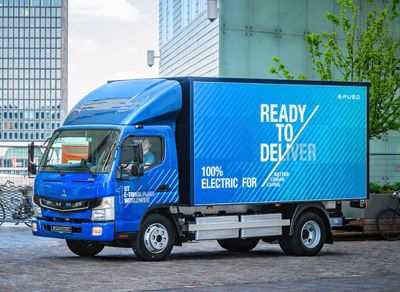
Where are EVs Headed in 2019?
Even if you closely follow the news, it’s difficult to pin down which direction electric vehicles (EVs) will be heading over the coming year. Production of certain hybrid models is ending, while other OEMs have promised to roll out more all-electric vehicles. Some car enthusiasts have proclaimed 2019 as the “year of the electric.”
Scott Shepard, senior research analyst/energy for market research and advisory company Navigant Research (www.navigantresearch.com), believes there’s plenty worth watching in the coming year – but not necessarily for fleets. “It looks like most of the conversation is going to be around long-range SUVs coming onto the market,” he said.
Jaguar, Audi, BMW, Hyundai and Kia are among the automakers with a U.S. presence that will be introducing new electric SUVs in 2019. A number of Chinese startup manufacturers also are expecting a big year ahead. “That’s all a big deal,” Shepard said. “These are the first vehicles that are competitive with a Tesla, with similar range characteristics as well as purchase price characteristics.”
For his part, Ted Davis, vice president, North American supply chain for fleet management company ARI (www.arifleet.com), pointed to California OEM Chanje Energy, which is “already taking orders for its Euro-style electric van.” Others, like ROUSH CleanTech, with its all-electric Ford F-650, and Mitsubishi Fuso, with its eCanter, should be taking orders later this year, pending road tests. Shepard pointed to Rivian, the talk of the Los Angeles Auto Show, for its sport pickup truck. “As the first models hit the road, we’ll begin to see how these units perform in real-world scenarios, and hopefully this insight will encourage more fleets to embrace this ever-evolving trend,” Davis said.
Questions and Concerns
Questions remain, however, particularly with regard to price and range – which can pose a challenge for utility fleets, especially fleets looking to use EVs for applications beyond those of pool vehicles. That’s something that Gary Lentsch, fleet manager for the Eugene Water and Electric Board in Eugene, Oregon, can attest to. The utility has had EVs since 1972, primarily in its light-duty fleet, so using them is not something new. But, he said, “Because of our service area, it’s really hard to come up with uses for those vehicles, mainly because of range.”
Lentsch also noted two other concerns. First, constantly improving technology means that fleet EVs become somewhat outdated after just a few years. The other concern is that “every time we get a foot forward with EVs or any other type of alternative fuel vehicles, the price of oil drops and we lose our momentum,” Lentsch said. “On the bright side, every time EVs come back in favor, they get better and better.”
The price point on larger utility trucks, though, remains out of reach for Eugene Water. “We’re a public utility, so we watch the money,” Lentsch said. “You can’t go out and buy something that, in two years, the technology is so much better that the vehicle just sits around.”
Change on the Horizon?
Power and size also are hurdles for other utility fleets, but change may be on the horizon. “Automakers are generally thinking more about larger vehicles,” Shepard said. “It is not just a North American phenomenon at this point. The vehicles coming to market in 2019 are primarily premium segments, but there are going to be more in the future in 2020 and 2021.”
It may be even longer before that trickles down to utility fleets, he said. For that to happen, “you have to see further improvements to battery prices and the scale from OEMs to get the prices to a competitive standpoint,” according to Shepard. “We do expect it, but when?”
Shepard noted that the next EV innovations likely will be in areas such as minivans and delivery vans. “Work trucks are difficult to electrify,” he said. “Service trucks are even harder.”
Already, though, electric-powered bucket trucks are on the market, allowing for gas engines with all-electric aerial units. “New technology allows utility workers to operate aerial devices for an entire workday without ever needing to start the truck, mainly due to advancing battery technology and lower production costs,” Davis said.
While pickup trucks and extended-range SUVs may make the news in 2019, any headlines about electric utility fleets will be further down the road, Shepard said. “We expect this to be a long approach before we really start to see these things in work trucks.”
Davis is a bit more optimistic, citing improvements in battery technology and OEM commitment to electric. “I believe it will only grow stronger as the technology continues to evolve,” he said. “Light- and medium-duty electric trucks are just now hitting the roads, but the innovation associated with these models as they come to market will certainly help fuel the bright future of electric vehicles.”
About the Author: Sandy Smith is a freelance writer and editor based in Nashville, Tennessee.
*****
Wireless Charging: A Coming Revolution?
Scott Shepard, senior research analyst/energy for Navigant Research, anticipates that the big EV news in 2019 may come from advances in wireless charging. “It’s going to come into premium vehicle segments as an option first,” he predicted. “It’s always been a retrofit option, but it’s so cheap and easy to use the cords that come with the vehicle.”
Wireless charging includes a ground pad that the driver parks over. A receiving system in the underside of the vehicle connects to the electronics and battery systems.
“The use cases now are for premium vehicles and vehicles in car-share programs,” Shepard said. “For fleets, the value diminishes. If you have dedicated parking for EVs and are on the economy side of the market, go for the cheaper charging.”


